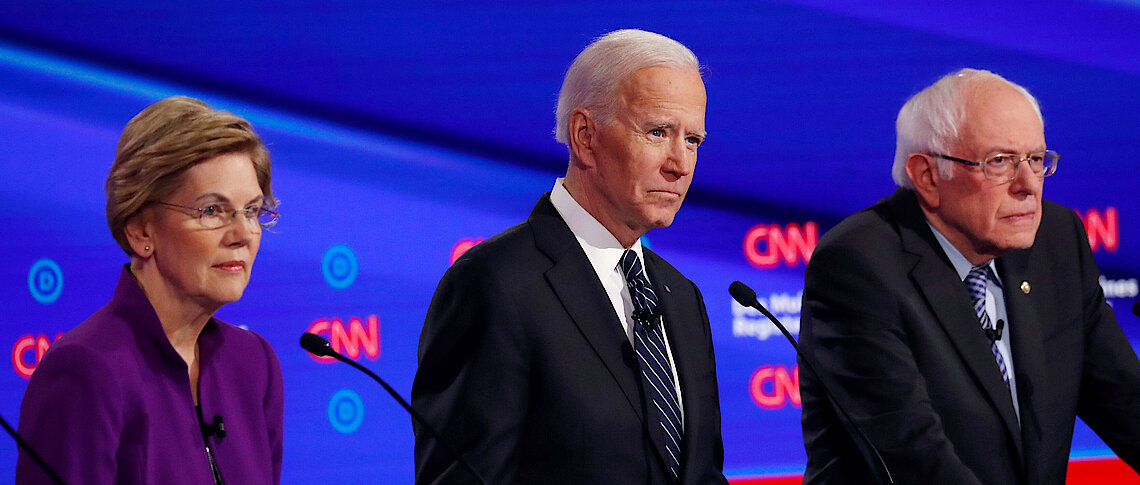Iowa is no stranger to earthquakes, of the political kind. As the first state to vote in America’s selection process for its presidential nominees, it has often raised the previously obscure to front-runner status and consigned presumed front-runners to history’s dustbin.
In 2008, Democrats in this disproportionately white state bestowed the majority of their votes on Barack Obama, awakening America to the possibility that its next president might well be African American. In 1976, they cast their votes for an obscure Southern governor named Jimmy Carter. Conversely, in 1984, the Democrat with the highest poll numbers against incumbent President Ronald Reagan – astronaut, senator and American hero John Glenn – spent a fortune campaigning in Iowa, only to finish fifth. Iowa results are not dispositive, but they matter a hell of a lot.
This year’s Iowa caucuses, which take place Monday night, appear poised to propel Vermont Senator Bernie Sanders to the position of, at least, co-front runner, a position he would share with former Vice-President Joe Biden. Caucuses, to which only the most motivated voters bestir themselves to attend, are notoriously difficult to handicap and the polls taken in the last two weeks show widely varying outcomes.
That said, Sanders is ahead when those poll results are averaged out, and perhaps more crucially, he has a clear lead in the one poll that’s almost always been right – that of the Des Moines Register. The Register’s reputation rests chiefly on its ability to project how many caucus attendees will be first-timers. This year, the Register has predicted that 30 per cent of attendees will be at their first caucus, an outcome that would clearly benefit Sanders, whose support is particularly intense and widespread among the young. (Biden’s support peaks among the elderly, who have been attending caucuses for decades.)
Iowa isn’t representative
Sanders also appears to have benefited from consolidating left-liberal support, which has come at the expense of his fellow critic of American capitalism, Massachusetts Senator Elizabeth Warren. Not just in Iowa polls but in national polls as well, Sanders’s numbers have risen as Warren’s have declined.
No such consolidation has taken place among backers of more center-left candidates, whose support, as registered in the polls, remains split among Biden, former South Bend, Indiana Mayor Pete Buttigieg and Minnesota Senator Amy Klobuchar. Nationally, the centrist field is even more crowded than it is in Iowa, for it also includes former New York Mayor Michael Bloomberg, who entered the race too late to compete in the first round of caucuses and primaries (in order, Iowa, New Hampshire, Nevada and South Carolina), but has already spent hundreds of millions of dollars in the 15 states that will hold primaries on ‘Super Tuesday,’ 3 March.
In fact, each of the leading Democrats has particular strengths and weaknesses which give none of them an edge in electability come November.
By rights, Iowa should not be a bell-weather state. Like New Hampshire, which will hold the first primary on 11 February (Iowa’s contest, remember, is a caucus), it is disproportionately white: Just 3.5 per cent of its population is black, 2.4 per cent Asian and 5.6 per cent Hispanic. By way of comparison: In the United States as a whole, 12.3 per cent of the population is black, 5.4 per cent Asian and 17.6 per cent Hispanic.
As the decades-long Republican embrace of racial bigotry and efforts to suppress minority voting has driven people of color almost entirely into the Democratic Party, the nearly all-white composition of the electorates in Iowa and New Hampshire makes those states particularly unrepresentative of the Democratic electorate as a whole. Nonetheless, coming as they do at the start of the process, they invariably winnow the field of Democratic candidates.
But Biden will not be winnowed. The third contest, that in South Carolina, features an electorate that is heavily black, and polls show him with a commanding lead there (though Sanders leads among blacks under 30). Sanders has also established a sizable lead among Latino voters of all ages in what is by far the largest state that will vote on Super Tuesday, California.
Who can defeat Trump?
Sanders’s likely emergence as a co-front-runner coming out of New Hampshire has raised alarms across much of the Democratic establishment, where many believe his chances to defeat Trump will be greatly undermined by his socialism, his long-ago enthusiasms for various somewhat authoritarian left regimes in developing nations, and his support for a universal Medicare program which would effectively abolish the private insurance industry to which many Americans have grown accustomed, despite its stratospheric costs and gaping holes in coverage.
In polls that pit Sanders against Trump, however, he runs about as well as Biden: Each has a several point lead. (Indeed, all the major Democratic candidates come out either with a narrow lead or roughly tied with Trump in these match-ups.)
In fact, each of the leading Democrats has particular strengths and weaknesses which give none of them an edge in electability come November.
Biden is strong with blacks and the elderly, but has scant support among the young. Sanders commands the support of the young like no candidate in recent American history, but is weaker among seniors and may well be weaker among the relatively small number of moderate Republicans who can’t abide Trump and voted for Democrats in the 2018 elections for Congress. His anti-establishment bona fides – the strongest any major presidential candidate has brought to a presidential campaign perhaps ever – also appear to have won him a receptive audience, at least, among white working class men who have been fleeing Democratic ranks for years, most recently to Donald Trump.
No matter the outcome of Iowa, of the entire primary process and even of November’s election, America’s Democratic Party, following the lead of the young and minorities, is becoming more social-democratic than it’s been at least since the New Deal.
Warren could command the support of the young and even some of those swing Republicans, but has been notably weak among working-class men of all races, among whom her school-teacher-professor persona is hardly a vote-getter. Buttigieg plays well among professionals, as does Warren, but has yet to make much impact in other constituencies. Bloomberg certainly appeals to the small number of Republican Never-Trumpers, but his longstanding support for the corporate trade agreements that effectively deindustrialised the Midwest would ensure he would lose the very swing states the Democrats must carry to prevail.
In sum, though many Democrats say they’ll vote for the candidate with the best chance of defeating Trump next November, the task of determining who that candidate would be is all but impossible.
Social democracy is stronger than ever
Does this mean that it’s just possible that American exceptionalism – the fact that only the United States, among the nations with advanced economies, failed to develop a socialist movement of any size or consequence – could be coming to an end?
What’s striking about the rise of Bernie Sanders, and Elizabeth Warren as well, is that the social-democratic policies on which they’ve campaigned – policies such as co-determination and a massive increase in social provision – are widely popular. To be sure, Warren calls herself a capitalist and Sanders cites Franklin Roosevelt as the leader in whose footsteps he’d follow, but both resonate with a younger generation whose experience with America’s financialised capitalism has been almost entirely negative.
What’s more, this pressure from the Democratic base, augmented by their own exasperation with an economy that mainly rewards wealthy shareholders at the expense of everyone else, has led even centrist Democrats to embrace positions well to the left of the Obama Administration’s. No matter the outcome of Iowa, of the entire primary process and even of November’s election, America’s Democratic Party, following the lead of the young and minorities, is becoming more social-democratic than it’s been at least since the New Deal. As the voting is finally about to commence, that’s the only political prediction I feel confident in making.






